Backpacking Greece: Top experiences
- Hiking the Samaria Gorge, from the tops of Crete’s White Mountains to the sea
- Cliff-jumping and swimming at Firiplaka Beach on Milos
- Setting out by boat to hidden lagoons, remote beaches, or the Santorini volcano
- Indulging in one of Europe’s – and the world’s – best cuisines at a local taverna
- Strolling the city streets in Corfu, Rhodes, Athens, or any Cyclades village
Jump to the list of posts from Greece, or read on for my comprehensive Greece backpacking guide.
Greece itinerary ideas
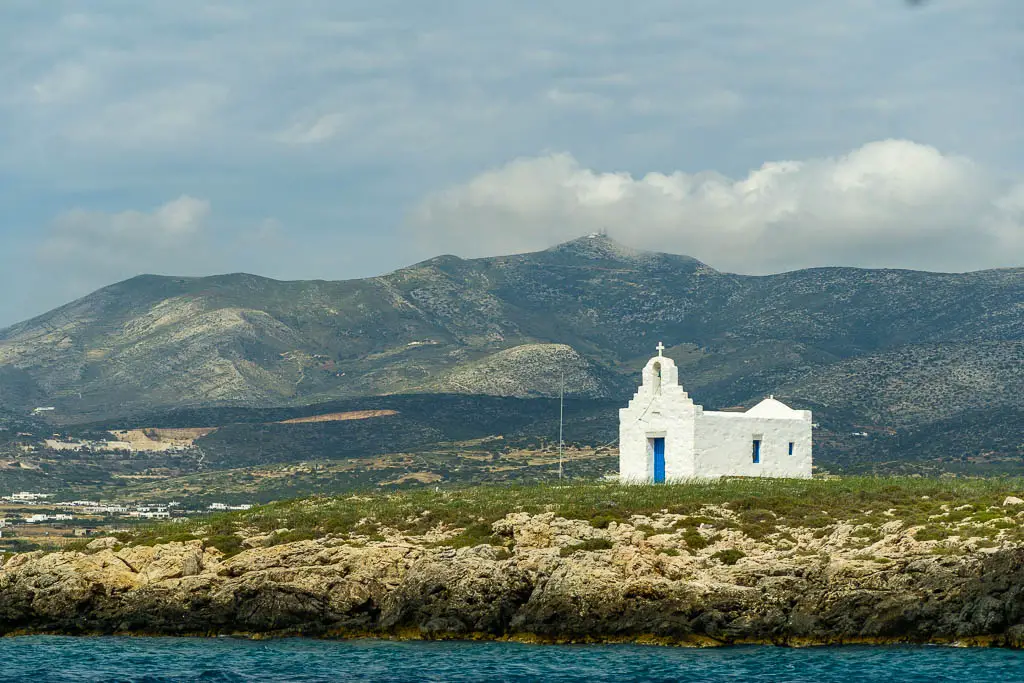
The first decision you’ll have to make when planning a backpacking Greece itinerary is, do you want to focus on the mainland or go island hopping? The mainland is ideal for history buffs, while the islands are great for nature and beaches.
If you choose the islands, the next question is which group? Greece has over 200 inhabited islands, and different “groups” require long ferries to get between. So you’ll get more out of your Greece backpacking itinerary if you keep it to no more than one island group a week.
The Cyclades are the most famous island group, and for good reason. The whitewashed buildings, iconic desert/cliff scenery, laid-back culture, and good ferry connections make this region ideal for a first-time trip. If you have a week, you could do either Milos-Paros-Naxos or Mykonos-Santorini, or mix and match. The former route is much more budget-friendly. With two weeks, you could thoroughly cover this region.
Other popular islands for an extended trip include Crete, Rhodes, Corfu, and Hydra. These are all great jumping-off points for their respective island groups as well.
It’s virtually impossible to plan a cheap Greece trip without a day in Athens. My advice: Give yourself just enough time to see the Acropolis and the other ruins, but you really don’t need more than 8 hours of sightseeing time in Greece’s most unpleasant city.
Greece weather and when to visit Greece
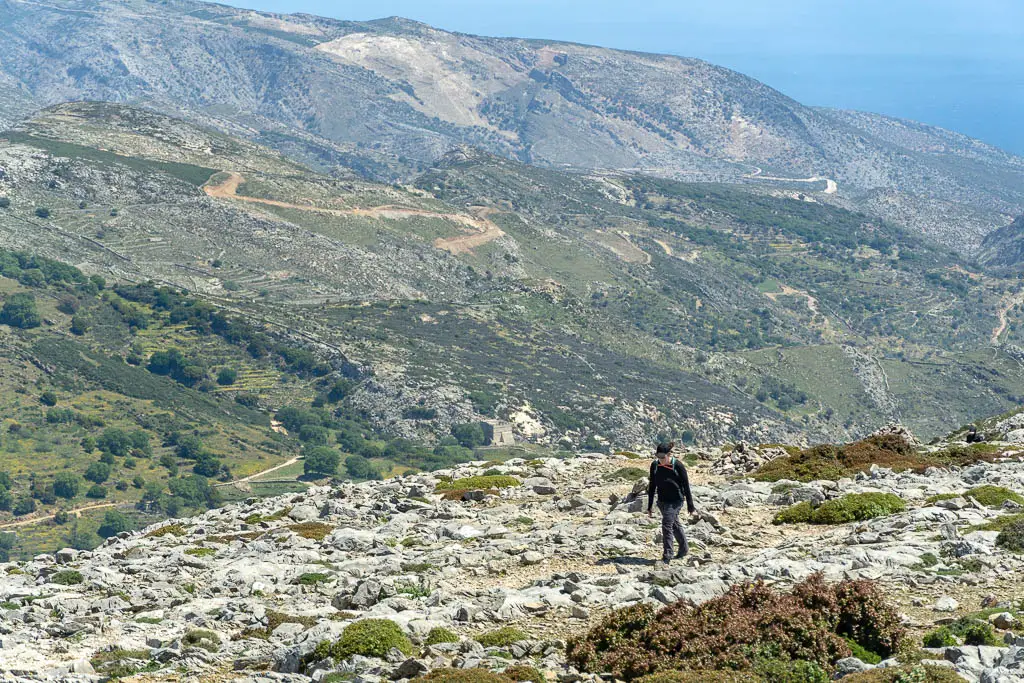
Greece’s climate is similar to the rest of the Mediterranean – hot, dry summers and cool-not-cold, very wet winters.
June-August is the peak tourist season for backpacking through Greece. You’ll be nearly guaranteed sunny weather, and it’s great for the beach. But prices skyrocket, the temperatures can be miserably hot if you’re not doing water activities, and it’s extremely crowded.
May and September are the ideal months to backpack around Greece. May is better for scenery – the wildflowers are in full bloom – while in September the ocean is warmer. Prices are radically lower in these off-season months, but you’ll have fewer ferry options.
If you visit between October and March, be prepared for a lot of rain. Most of the islands shut down in off-season and you can’t reach them by ferry at all. It’s still possible to fly to some of the major airports like Santorini and Crete, but winter trips are better off focusing on the mainland.
Language in Greece
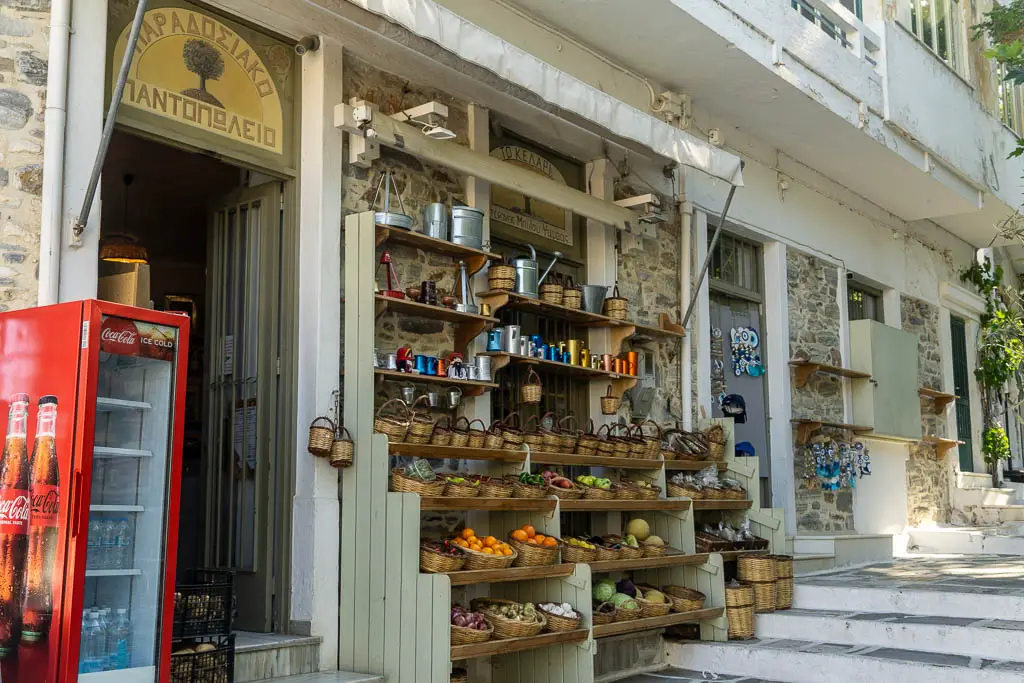
Greek is one of the oldest and most influential languages in the world. If you speak English and got through high-school-level math and science courses, you probably have more familiarity with Greek than you realize!
The Greek alphabet has 24 letters, which each have an upper- and lowercase and a cursive and print variation. As the influence for both the Latin and Cyrillic alphabets, the letters will be familiar to readers of either. It takes about an hour of studying the script and consistent practice while you travel to get comfortable reading it.
When it comes to spoken Greek, the key is to pay attention to where the accent/emphasis is. Here are a few key words with the emphasized syllable bolded:
- Good morning/good evening: Kalimera/Kalispera
- Hello: Yassou
- Thank you: Efharisto
- You’re welcome/ok/yes (used similarly to the Italian prego): Parakalo
- Goodbye: Adio
Greek people greatly appreciate even the smallest effort to speak Greek. Even if all you can say is hello and thank you, you’ll stand out from most package tourists. Better yet – every time you meet someone new, ask them to teach you a word or two.
Budget for Backpacking in Greece
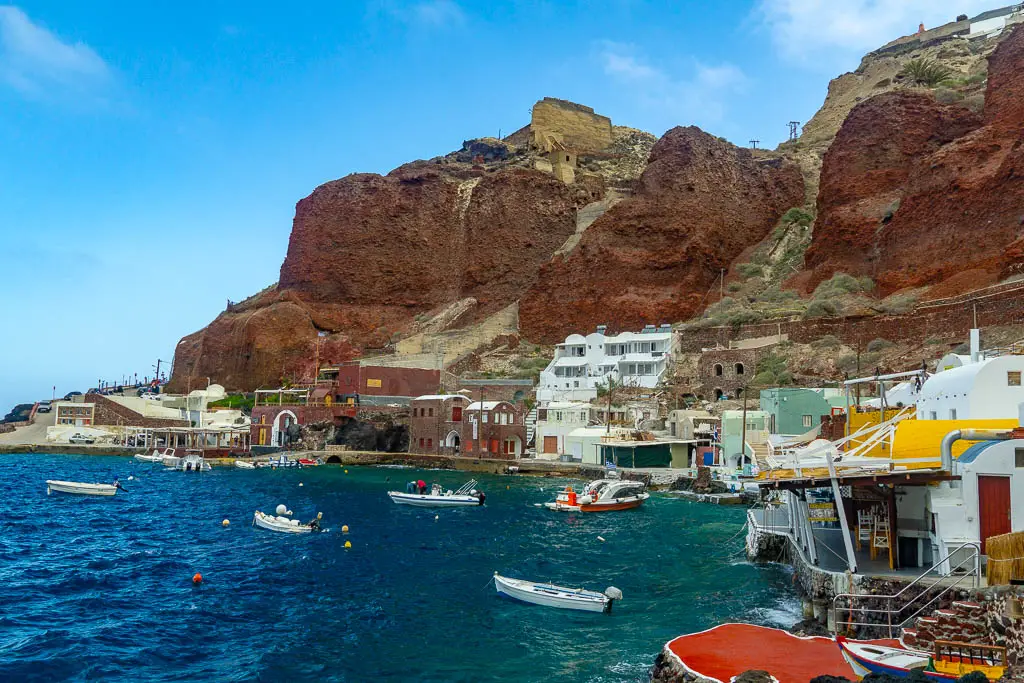
Backpacking Greece can range from very cheap to very expensive. Costs vary widely depending on where you are, the season, your group size, how much you move around, and which activities you choose.
On the low end, you could backpack in off-season on mainland Greece for under €30 a day. You’d mostly eat street food or cook, stay in hostel dorms, and you wouldn’t be able to move around every other day. But the historical sites are not expensive and the beaches and hiking are free, so you’d have plenty to do.
On the high end, visiting Santorini and Mykonos in July would run you closer to €100 a day with the same standards of travel. Add a couple higher-end activities like a night out at the clubs or a boat trip and you could easily push it closer to €150-200.
Food, accommodation, and transport are all dramatically cheaper if you have people to share with. A group of 3-4 is ideal for a trip backpacking in Greece.
Sample costs
Due to the dramatic variation in costs in Greece, I’ve included costs that are in the mid-range. This is what to expect in the Cyclades in May, not including Santorini or Mykonos. Adjust it down 10-15% for any other island group, and up 50% or more for high season travel.
- Private room in a budget hotel: €20
- Meal at a local restaurant: €8-10
- Cup of Greek coffee: €2
- Admission to the Acropolis: €20
- Ferry from Athens to Naxos: €40-70
- Car rental (manual small car) for 5 days: €50 + €20 in gas
- Samaria Gorge hiking tour: €45 including all transport and admission fees
- All-day boat trip on a small charter: €120
Greece visa requirements

Greece is a member of the Schengen Group. U.S. citizens can travel visa-free in the region for up to 90 days out of every 180 days. So if you’re on a longer Europe trip, you’ll need to total up your dates in the entire region to make sure you don’t overstay. This also applies to citizens of most other Western countries.
If you live within the Schengen zone, you can travel freely between all countries within the zone.
Accommodation in Greece

Greece has accommodation ranging from cheap hostels to luxury beachfront resorts. The good news: if you’re traveling in a group, you can find excellent value.
The best option on the Greek islands is an apartment or studio. These are widely available on Booking.com. The owner is often (but not always) on-site, and often these places offer top-notch hospitality. Prices can be as low as €10 per person for a night, but €20-30 per person will get you something much nicer. You often get a kitchenette in these rooms, so you can also save money by making breakfast in your room.
Hostels are always an option for solo travelers, but they are poor value for money. Surprisingly, many hostels in Greece are in really inconvenient locations as well.
Athens, Santorini and Mykonos offer the worst value for money. Less touristic islands like Milos and Naxos – and less touristic parts of Crete – offer the best value.
Food in Greece
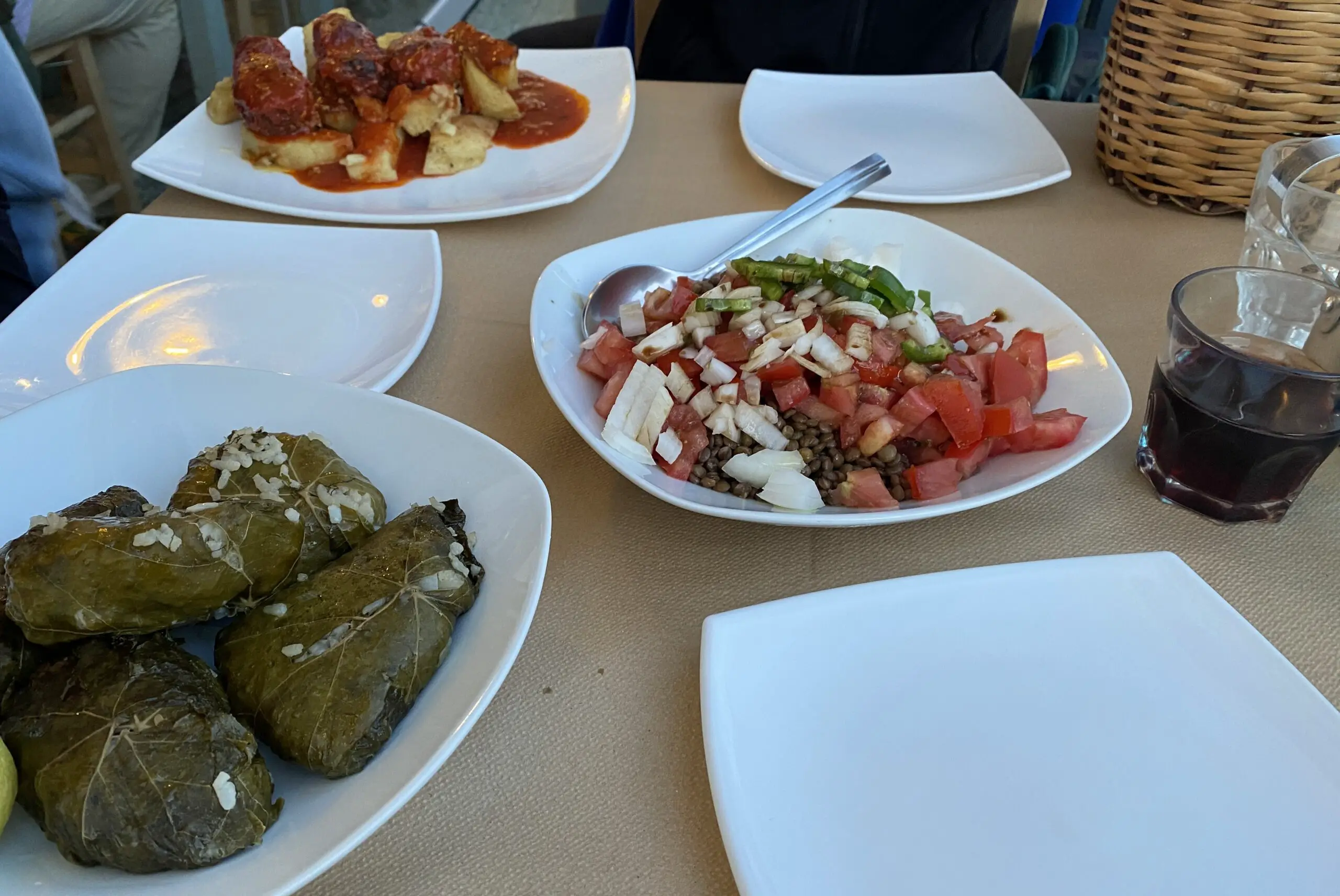
The food is one of the best parts of backpacking Greece. The cuisine is deceptively simple – lots of vegetables, beans, and grilled meat. But it’s oh-so-delicious when combined with fresh dill and loads of olive oil.
Street food is widely available and very affordable. The most common options are souvlaki and gyros – grilled or spit-roasted chicken or pork, served in a pita with salad and tzatziki. If you get a takeaway gyro it’ll only run you about €2, or maybe €5 on Santorini. Cheese pies and spanakopita – ubiquitous at bakeries – also make good street food options at around €1 each.
For a local but affordable food experience, head to the tavernas. You typically order for the table, and portions are large – my group of three usually chose one appetizer, one salad and one entree and we were invariably stuffed. This ran us €8-10 per person including wine.
A few favorite dishes include moussaka, eggplant in tomato sauce, chickpeas, elephant beans with spinach (often labeled “giant beans”), stuffed tomato/eggplant/zucchini, meatballs, grilled seafood, tzatziki, Greek salad, grilled slices of feta or local cheeses, and roasted lamb. You pay extra for bread, but it’s not expensive.
Be sure to try the local specialties when possible. Naxos is famous for its cheeses and potato dishes. Corfu and the Ionian islands have a heavy Italian influence on their food. Crete has an entire independent food tradition that you could spend months exploring.
After your meal, you’ll often receive a small dessert for free. Additionally, some places offer a digestive, or on Crete, you’ll invariably have a small bottle of raki (the local liquor) dropped off at your table.
Drinks in Greece
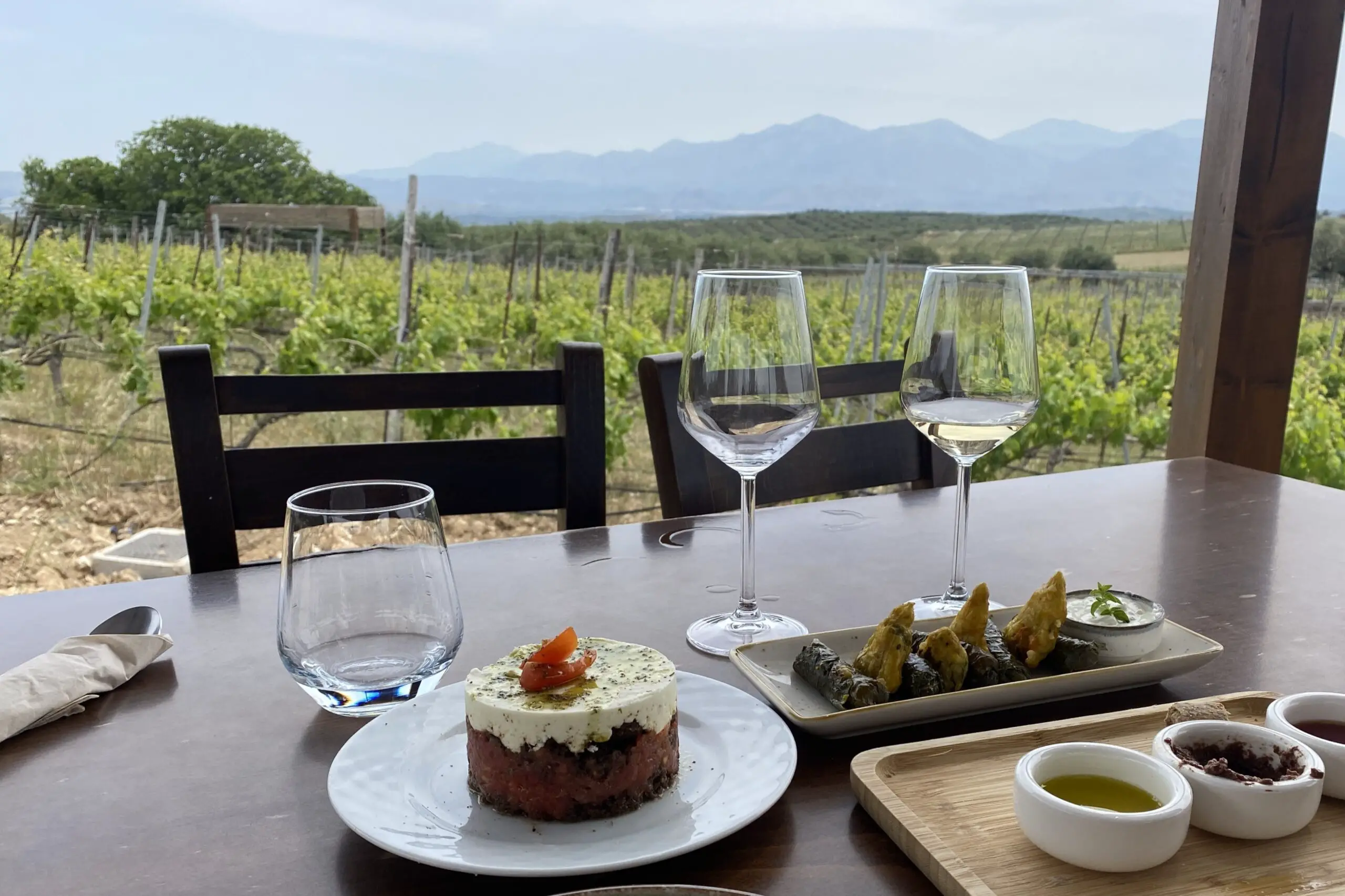
Greece combines the best of the Mediterranean, Eastern Europe, and the near East with its beverage offerings.
Mornings usually start with a strong cup of Greek coffee. It’s the same as Turkish coffee – strong, sludgy at the bottom (don’t drink the grounds), and best with lots of sugar.
Greece also has an excellent wine tradition. Nearly every inhabited area has a vineyard or two, and it’s typical to share a small carafe of wine with lunch and dinner. While Santorini offers world-famous wine tours, I most enjoyed the wine and the views from the vineyards on Crete (for a fraction of the price).
If you go out for mezethes (the Greek word for mezze – small plates), you may want to sample the ouzo to go along with it. This moderately strong liquor is meant to be sipped with snacks. It has a strong licorice flavor, similar to Italian amoro.
Raki is the other ubiquitous liquor you’ll encounter. It’s on menus almost everywhere, but it’s especially popular in Crete. Walk into any taverna, shop, hotel, etc. and you’ll almost certainly be offered a shot of it (it’s also meant to be sipped). It’s stronger than ouzo but not as strong as vodka or rum, and has a mild flavor that’s especially pleasant with something sweet.
Activities you can do while backpacking Greece

No matter what type of traveler you are, you’ll find activities you enjoy in Greece.
Some of the best things to do include hiking, swimming, wandering around villages, learning about the history, eating, dancing, and relaxing on the beach.
If you’re traveling Greece on a budget, you’ll find no shortage of free activities. Nearly all of the beaches are free to access. Most hiking trails are free, and when there are park fees, they’re small (like €5 at the most). Even a lot of the Roman and Greek ruins are free – only major ones like the Acropolis charge big admission fees.
The one expensive must-do activity on the islands is a boat trip. The islands all have beaches and scenery that can’t be accessed by land, so a boat is necessary to see the most dramatic spots. Plus, hanging out on a boat all day is super pleasant. These trips can be as affordable as €25 for a full-day caldera trip on a large boat in Santorini, to €100+ for a smaller charter that includes lunch and drinks on a less touristic island.
In high season, book excursions a few days in advance. In shoulder season you can usually book in-person at a tour agency the day before, but if you have your heart set on a particular tour, it’s worth booking early. If you plan to do a boat trip, set it up for your first day on the island – weather can throw a wrench in sea-based plans.
Always verify recommendations from hotels with your own research. Hotels generally earn commission from tour companies. It’s really hard to get impartial recommendations on the ground. (That said, most tour companies in the budget category are fine and none of them really stand out, so don’t torture yourself trying to find the perfect option either. Just make sure you know exactly what’s included in advance.)
Transportation in Greece
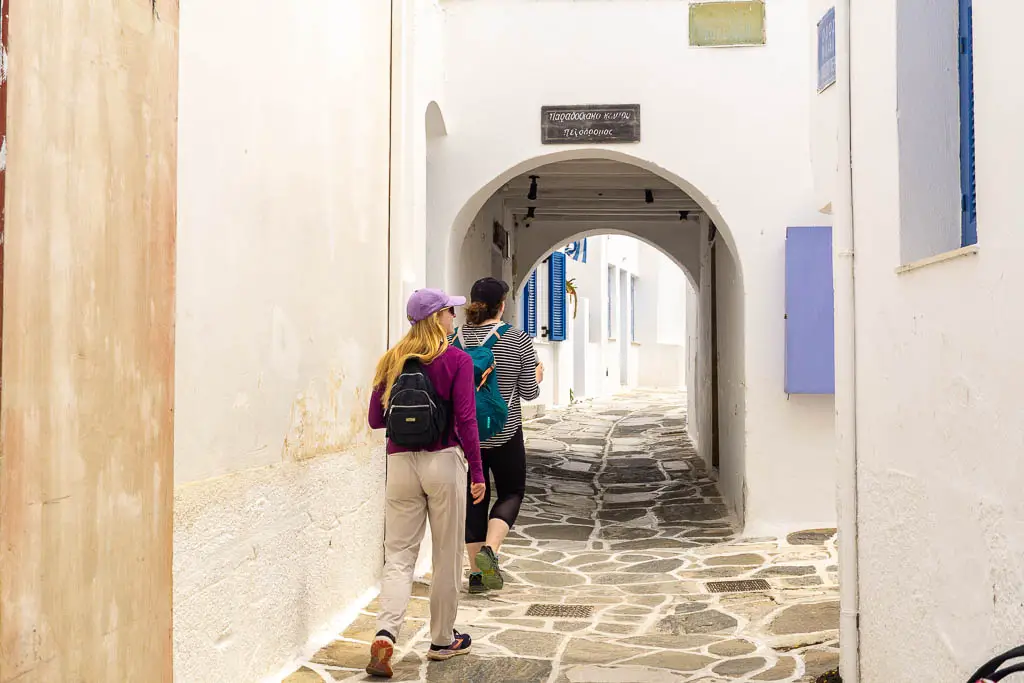
Greece is a reasonably easy country to travel by public transport. The country has a solid bus system and even some trains. But the main mode of transport is the ferries.
Ferries connect most islands within an island group to each other, and major islands in each group to Athens. They range from small boats to massive car ferries that rival cruise ships in size and include luxury sleeping cabins.
The ferries can be quite expensive, so backpackers in Greece can save money by visiting fewer islands for longer. Budget at least €40 for a 90-minute hop or €80 for longer trips.
You can map out your journeys and buy tickets on FerryHopper. Book popular routes a few days in advance – it’s usually cheaper to buy online than in-person. Cancellations and schedule changes are common; you’ll be notified by email.
A word of warning – seasickness is possible anywhere at any time, but ferries to Crete are infamously rough. (Speaking from experience – I’m pretty sure 80% of the boat got sick on the trip I was on.) It’s worth considering a cheap flight instead.
Once you get to each island, the best way to get around is car rental. In shoulder season this can cost as little as €10 per day. Greeks drive on the right and the traffic isn’t too terribly crazy. Still, it can be stressful driving in towns. Get the smallest car your group can fit in, and you’ll need an international driving permit if you don’t have an EU license.
You can rent ATV’s and motorbikes as well, but these aren’t particularly pleasant or safe modes of travel. Not only will you be subjected to the harsh sun and wind all day – if you get in an accident, your travel insurance probably won’t cover you.
Safety when backpacking Greece
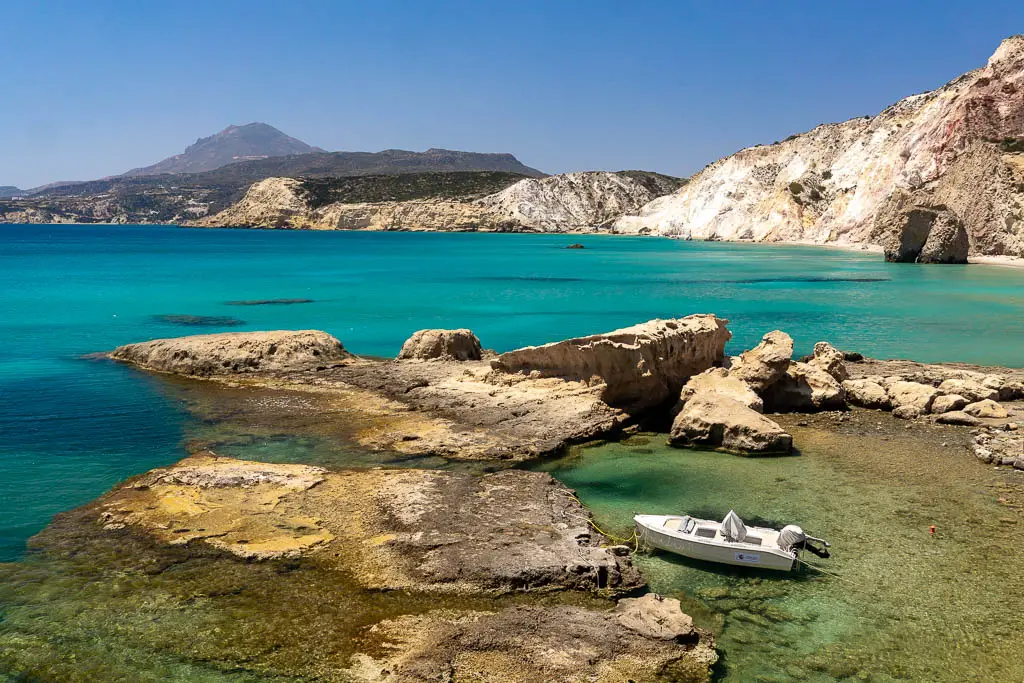
In general, Greece is an extremely safe country to travel in. Violent crime is low, and I felt comfortable walking around by myself late at night everywhere.
The biggest safety issue is pickpocketing. Central Athens is infamous for it – the streets are extremely crowded. Keep your valuables close while exploring the city or leave them at your hotel.
Several of the Greek islands have party scenes that can get a bit dodgy. Keep an eye on your drink at all times at clubs, and consider keeping your alcohol consumption to a minimum.
The natural world can cause some level of risk in Greece. Santorini’s Red Beach is closed due to rockfall. Currents and waves can be dangerous. Hiking trails are usually not well-established or marked.
Finally, traffic safety can be an issue. Locals drive like mad-people and drunk driving is a common issue at night. Drive defensively, drive sober, and be careful about goats in the road!
Greece travel advice for women alone
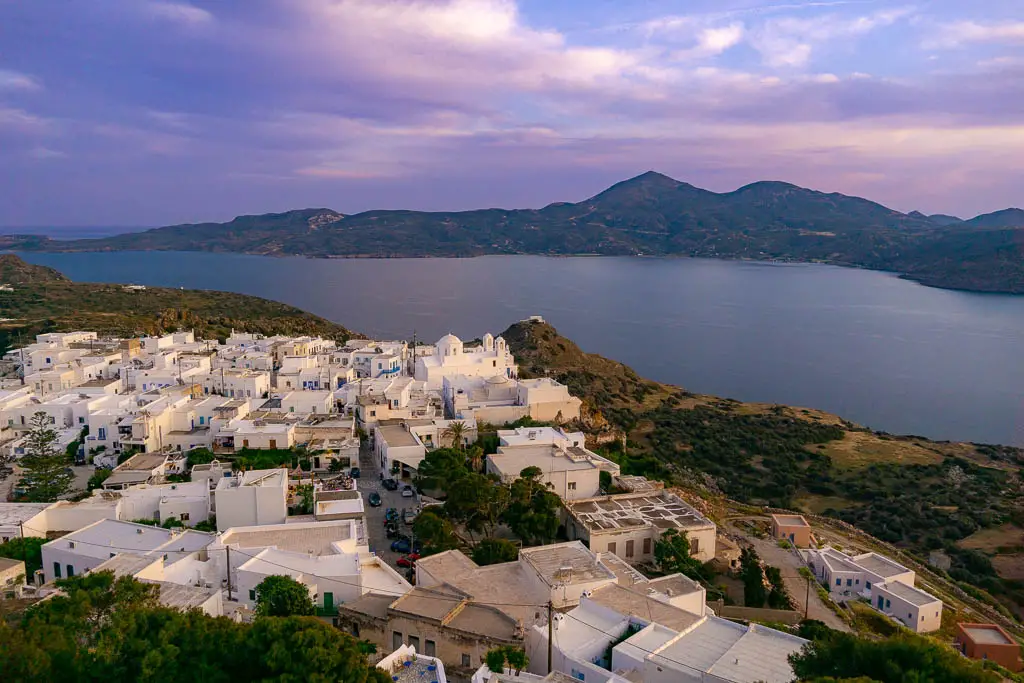
Greece doesn’t require any gender-specific precautions.
It is still the Mediterranean, so you can expect a bit of male attention. This mostly manifests in the form of staring/gawking, or mild flirtation. It’s easy to ignore or fend off.
You’ll quickly notice the local-centric cafe-bars are dominated by older men in the evenings. This doesn’t mean you can’t go to these places, it just means you’ll stick out more than you might at home. If you’re uncomfortable, you can always find a more touristic option with a greater diversity of customers.
You’ll fit in wearing beachwear, shorts, tank tops, and short dresses in towns and cities. The only time you need more conservative clothing is when visiting churches – all genders are expected to cover shoulders and knees.
Pack a scarf or sarong for this purpose, or you can borrow one at touristy churches.
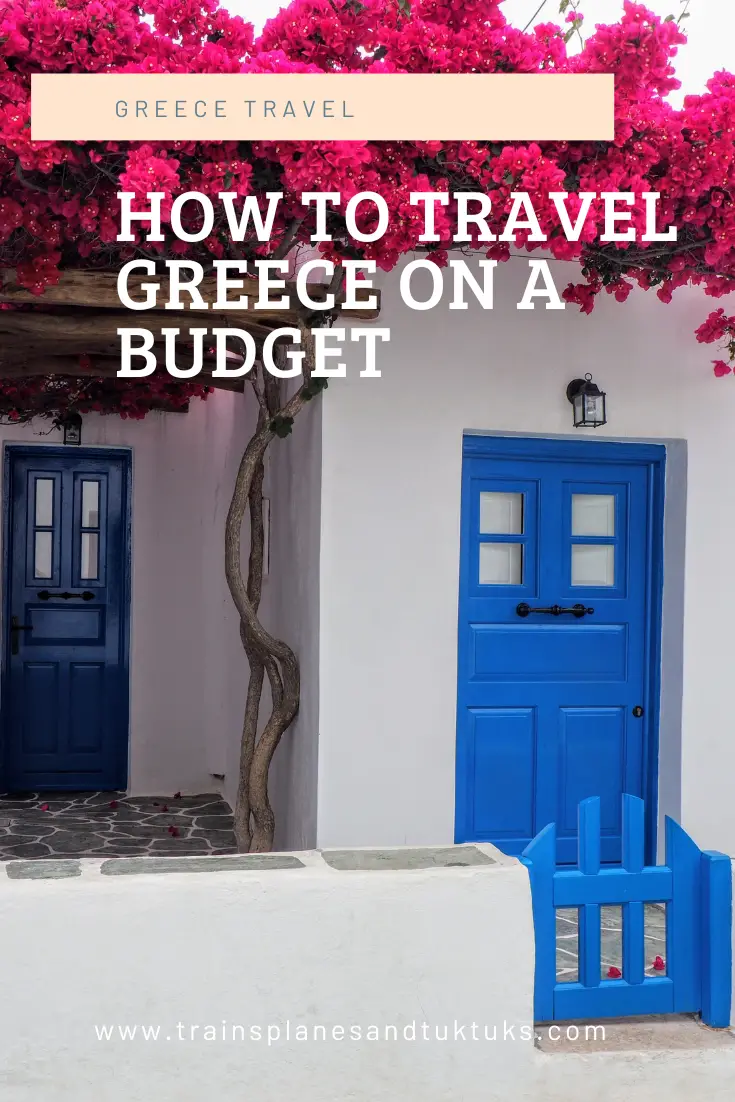
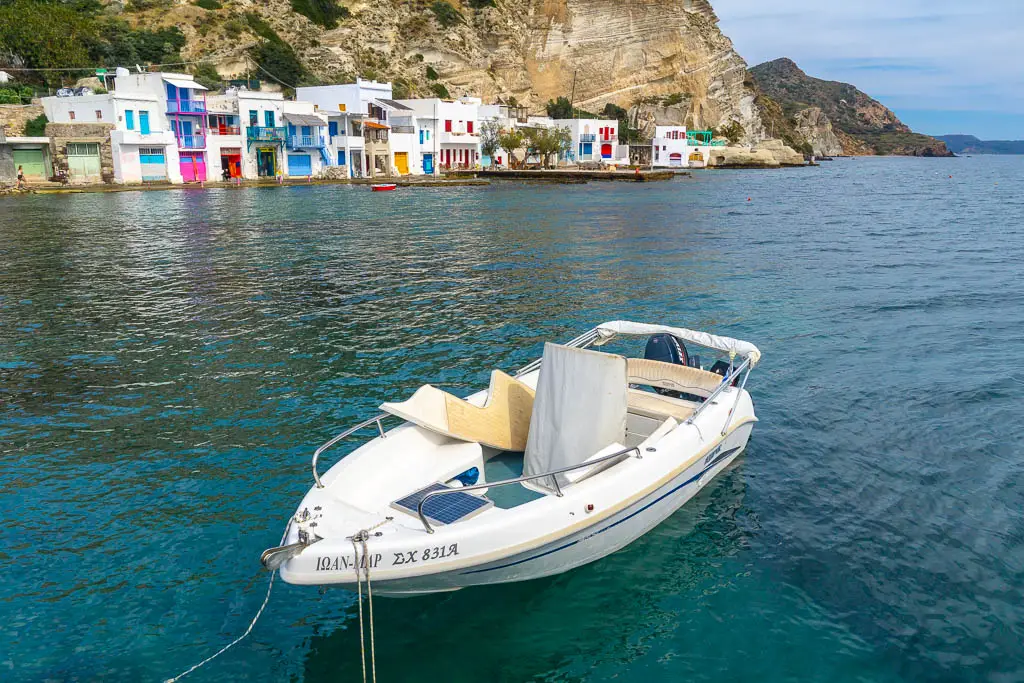
Greece is on my radar in 2024 after I missed out on my island vacation during the pandemic. I will save this post.
I’ve been to Greece a few times and find it amazing every time. These are great suggestion how to spend your time backpacking.
I’m going to Greece in October and really enjoyed reading this post. Very informative. It will help with budgeting as well.